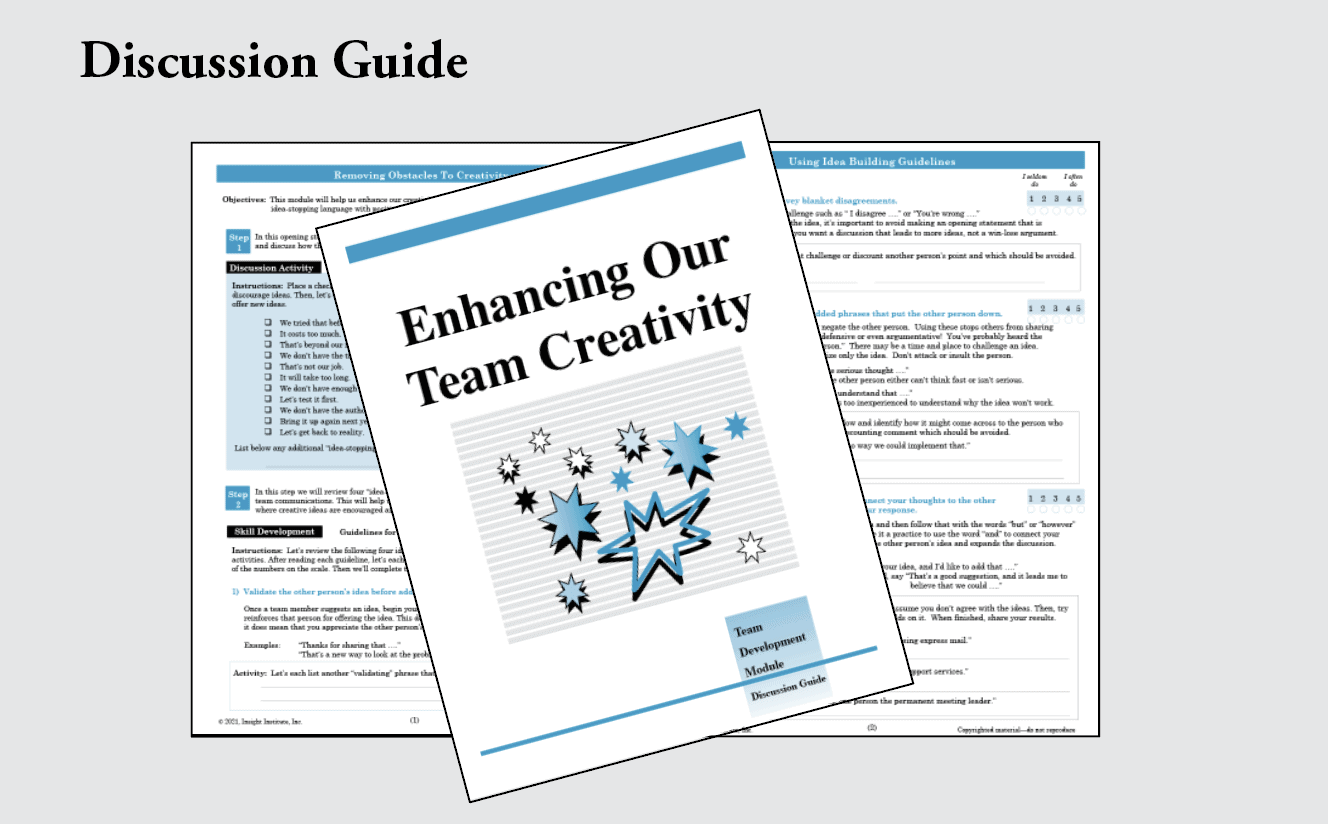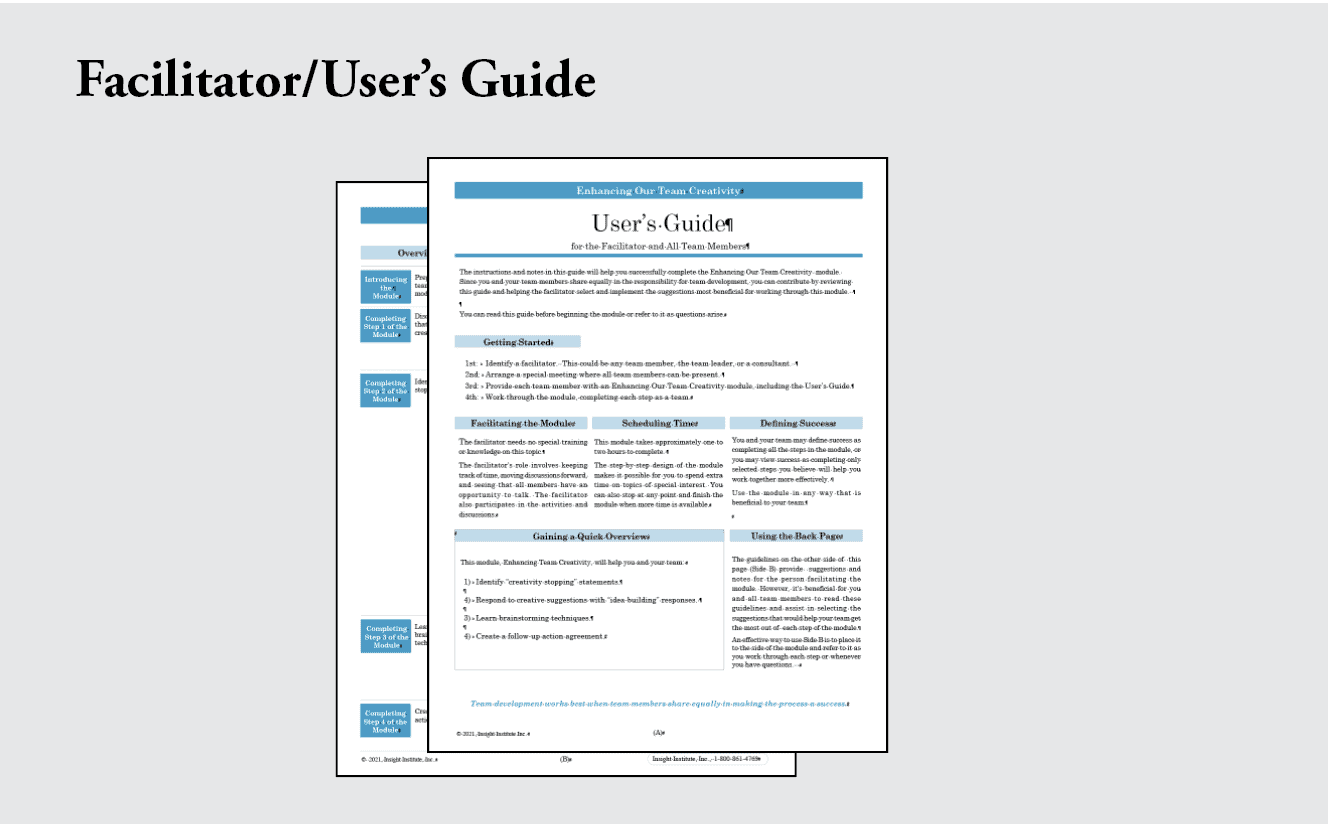OBJECTIVES
To help your team remove obstacles to creativity, use brainstorming techniques effectively, and respond positively to ideas offered by each other.
ABOUT
The module helps teams look at the process they use to gather creative ideas and how they support each other when generating these ideas. Team members gain a perspective on how many “idea stoppers” may exist within their team and their organization and learn strategies for spotting these early and using alternative techniques that encourage creativity. Members also review the best-practice guidelines for brainstorming and decide together which ones they want to use more often.
WHEN TO USE
Use this Module when:
- teams have adopted a limiting mindset or perhaps even negative attitude about new ideas
- there is a pattern of blocking or killing new ideas before they can even be explored in more detail
- members resist change and don’t readily entertain new approaches to doing things or creative ideas
- a team fails to build on each other’s ideas and validate each other’s opinions and have, at times, grown critical and close minded
This module, Enhancing Our Team Creativity, has two components.
1) The Discussion Guide
This discussion guide, which is what the team members complete, contains step-by-step interactive fields, check boxes, and open fill-in spaces. This guide can be completed online using the interactive pdf and then shared or referenced as the team discusses each step. Some steps are designed to be completed together.

2) Facilitator/User’s Guide
These support materials are available to help guide the leader or facilitator through the steps of the discussion guide.
The facilitator may be an outside consultant, the team leader, or one of the team members. However, everyone can help ensure success by reading through some of the tips and suggestions in this guide.

NOTES FROM DR. PATRICK HANDLEY

There is an old saying, “Don’t listen to what someone says, watch where their feet go.” This means that team leaders frequently say they support creativity and new ideas, but they may really be resisting or negating these. Sometimes they are unaware of their idea blocking behavior, believing they are giving realistic feedback regarding why ideas won’t work. Then overtime for some “unknown” reason, members offer up fewer and fewer ideas and creativity seems to stop.
This module can help leaders refresh their thinking on how to draw out and support creativity. Also, don’t be fooled when team members say they are open to new ideas. Observe what they are doing too. Often members find comfort in doing things the same way and thinking in repetitive patterns. Sometimes its easy to settle into routines and members get comfortable with the status quo.
This module can help both leaders and team members learn, explore, and “own” their responsibility in encouraging team creativity. Consider working through this module, sometimes in spite of comments from the team that they are good-to-go in this area. This is a competence and skill that teams often have blind spots about and the module opens them up to new levels of creativity which all teams can benefit from.
STEPS
In this module team members:
1) learn to identify “idea-stoppers” and the frequency in which they use them
2) discover the power of four “idea-builders” and how to use them to enhance creativity when problem solving
3) review the guidelines to effective brainstorming and try this technique on a relevant issue facing them
4) agree on additional ideas for helping them be more creative
LEADER/FACILITATOR TIPS
Teams can increase their openness to creative ideas and the approaches they use to solicit these benefit from working through this module even though they may say they don’t need it.
Many teams claim to be good at brainstorming but then consistently break the guidelines, particularly the one about finding fault before an idea is fully explored.
Encourage teams to find a way to call out an idea stopper in a fun manner, perhaps ringing a bell or pushing a button, to that they have a laugh or two but also make it. permissible to alert each other when an idea gets squashed prematurely.
